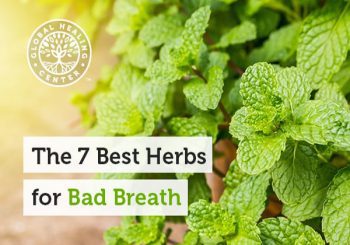Guest Writer for Wake Up World
Whether caused by an easily controlled concern or the result of a more serious condition, you don’t want to live with bad breath. The good news is – you don’t have to. The following seven herbs have been proven to go beyond trying to hide bad breath and help to actually get rid of it. When used, especially together, these herbs help cleanse your mouth and freshen your breath.
- Peppermint
- Tea Tree
- Sage
- Myrrh
- Clove
- Pine Needle
- Eucalyptus
Herbs for Bad Breath
1. Peppermint
A large majority of toothpastes contain peppermint flavoring, and this isn’t by accident. Peppermint has the ability to give the mouth a fresh, clean feeling. Essential oils from peppermint (real peppermint, not flavoring) does much more than create a fresh feeling. One study showed that peppermint oils actually help reduce bad breath more effectively than a lab-produced chemical rinse. [1]
2. Tea Tree
Tea tree oil has been long known among natural health practitioners for its toxicity to harmful, bad breath causing organisms. With these powerful properties, researchers have examined the effectiveness of tea tree oil extract in mouth rinses. One such study found tea tree oil eliminated a wider range of microorganisms than the chemical chlorhexidine. [2] Another study found that Solobacterium moorei, a bacteria associated with halitosis, was highly susceptible to the effects of tea tree oil. [3] Included in a rinse, it offers a complete cleansing effect in the battle against bad breath. Tea tree oil has also been found successful in addressing Candida, which can cause bad breath. [4]
3. Sage
Sage has been known since ancient times as a healing herb. Modern research has only validated its effectiveness against harmful organisms and its powerful halitosis fighting abilities. Sage has been shown to be effective against bad breath causing organisms such as Candida albicans, Streptococcus mutans, and Porphyromonas gingivalis. [5]
4. Myrrh
Myrrh has been used for thousands of years in a myriad of ways. For those looking to battle bad breath – whatever the cause – myrrh is a potent natural remedy because it helps cleanse the mouth of germs and also addresses conditions that may encourage future growth. [6] [7]
5. Clove
In Chinese medicine, bad breath is considered a result of Qi stagnation. According to the Chinese, clove encourages Qi flow and clove has a long history in Chinese medicine for remedying bad breath. Modern studies have found clove to be an effective component of mouth rinses. In one study, participants preferred it to a chemical based mouth rinse in terms of taste, after-taste and ease of use. [8] The authors of this study also noted that mouth rinses using herbs like cloves also presented viable alternatives for individuals who could not use chemical rinses.
It shouldn’t surprise anyone that a natural product swirled around in the mouth would taste and feel better than something out of the lab.
6. Pine Needle
Pine resins and oils have been used historically for a range of medicinal therapies. Pine naturally contains terpene alcohols which are potent cleansing agents and toxic to harmful organisms. Researchers have also determined pine oils offer powerful antioxidant properties. [9] As a component of a mouth rinse, pine needle supports overall mouth health!
7. Eucalyptus
For reducing bad breath, eucalyptus has demonstrated remarkable effectiveness. In a 2010 study, eucalyptus was found to eliminate mouth malodor by significantly reducing volatile sulfur compounds (the ones that make your breath wretched). [10] The success of eucalyptus in this study demonstrated that its cleansing effects worked both in the lab, as well as in practice.
Relieving Bad Breath with Herbal Remedies
These herbal remedies have been used medicinally for centuries! Current research has only proven what natural healers have known for ages… these natural remedies work! Essential oils are available for all of them and can be made into a mouth rinse or added to your toothbrush. Peppermint and sage leaves can also be chewed. In either case, remember to look for organic herbs.
References:
- Hur MH, Park J, Maddock-Jennings W, Kim DO, Lee MS. Reduction of mouth malodour and volatile sulphur compounds in intensive care patients using an essential oil mouthwash. Phytother Res. 2007 Jul;21(7):641-3.
- Groppo FC, Ramacciato JC, Simões RP, Flório FM, Sartoratto A. Antimicrobial activity of garlic, tea tree oil, and chlorhexidine against oral microorganisms. Int Dent J. 2002 Dec;52(6):433-7.
- Forrer M, Kulik EM, Filippi A, Waltimo T. The antimicrobial activity of alpha-bisabolol and tea tree oil against Solobacterium moorei, a Gram-positive bacterium associated with halitosis. Arch Oral Biol. 2013 Jan;58(1):10-6. doi: 10.1016/j.archoralbio.2012.08.001. Epub 2012 Aug 29.
- Hammer KA, Carson CF, Riley TV. In-vitro activity of essential oils, in particular Melaleuca alternifolia (tea tree) oil and tea tree oil products, against Candida spp. J Antimicrob Chemother. 1998 Nov;42(5):591-5.
- Sterer N, Nuas S, Mizrahi B, Goldenberg C, Weiss EI, Domb A, Davidi MP. Oral malodor reduction by a palatal mucoadhesive tablet containing herbal formulation. J Dent. 2008 Jul;36(7):535-9. doi: 10.1016/j.jdent.2008.04.001. Epub 2008 May 12.
- de Rapper S, Van Vuuren SF, Kamatou GP, Viljoen AM, Dagne E. The additive and synergistic antimicrobial effects of select frankincense and myrrh oils–a combination from the pharaonic pharmacopoeia. Lett Appl Microbiol. 2012 Apr;54(4):352-8. doi: 10.1111/j.1472-765X.2012.03216.x. Epub 2012 Feb 20.
- Lawless, J. (2002) The Encyclopedia of Essential Oils, Harper Collins, p135.
- Malhotra R, Grover V, Kapoor A, Saxena D. Comparison of the effectiveness of a commercially available herbal mouthrinse with chlorhexidine gluconate at the clinical and patient level. J Indian Soc Periodontol. 2011 Oct;15(4):349-52. doi: 10.4103/0972-124X.92567.
- Zeng WC, Zhang Z, Gao H, Jia LR, He Q. Chemical composition, antioxidant, and antimicrobial activities of essential oil from pine needle (Cedrus deodara). J Food Sci. 2012 Jul;77(7):C824-9. doi: 10.1111/j.1750-3841.2012.02767.x.
- Tanaka M, Toe M, Nagata H, Ojima M, Kuboniwa M, Shimizu K, Osawa K, Shizukuishi S. Effect of eucalyptus-extract chewing gum on oral malodor: a double-masked, randomized trial. J Periodontol. 2010 Nov;81(11):1564-71. doi: 10.1902/jop.2010.100249. Epub 2010 Jul 1.
Originally published at Global Healing Center and reproduced here with permission.
Recommended articles by Dr. Edward Group:
- What are Whole Foods and Why are They Important for Health?
- Top Vitamin C Benefits for the Skin
- Wim Hof Breathing: 6 Benefits for Body and Mind
- Camu Camu: The Next Great Superfood
- Emotional Freedom Technique (EFT): 5 Benefits and How To Do It
- Enokitake Mushrooms: 7 Benefits of this Superfood
- Here are 7 Reasons to Try a Cleanse
- 3 Scientifically Proven Ways Meditation Boosts Your Immune System
- What is Candida? Understanding Yeast Imbalance
- Acerola Cherry: 8 Benefits of this High-C Tropical Super Fruit
About the author:
Dr. Edward F. Group III (DC, ND, DACBN, DCBCN, DABFM) founded Global Healing Center in 1998 with the goal of providing the highest quality natural health information and products. He is world-renowned for his research on the root cause of disease. Under his leadership, Global Healing Center earned recognition as one of the largest natural and organic health resources in the world. Dr. Group is a veteran of the United States Army and has attended both Harvard and MIT business schools. He is a best-selling author and a frequent guest on radio and television programs, documentary films, and in major publications.
Dr. Group centers his philosophy around the understanding that the root cause of disease stems from the accumulation of toxins in the body and is exacerbated by daily exposure to a toxic living environment. He believes it is his personal mission to teach and promote philosophies that produce good health, a clean environment, and positive thinking. This, he believes, can restore happiness and love to the world.
For more, please visit Global Healing Center.

If you've ever found value in our articles, we'd greatly appreciate your support by purchasing Mindful Meditation Techniques for Kids - A Practical Guide for Adults to Empower Kids with the Gift of Inner Peace and Resilience for Life.
In the spirit of mindfulness, we encourage you to choose the paperback version. Delve into its pages away from screen glare and notifications, allowing yourself to fully immerse in the transformative practices within. The physical book enriches the learning process and serves as a tangible commitment to mindfulness, easily shared among family and friends.
Over the past few years, Wake Up World has faced significant online censorship, impacting our financial ability to stay online. Instead of soliciting donations, we're exploring win-win solutions with our readers to remain financially viable. Moving into book publishing, we hope to secure ongoing funds to continue our mission. With over 8,500 articles published in the past 13 years, we are committed to keeping our content free and accessible to everyone, without resorting to a paywall.








